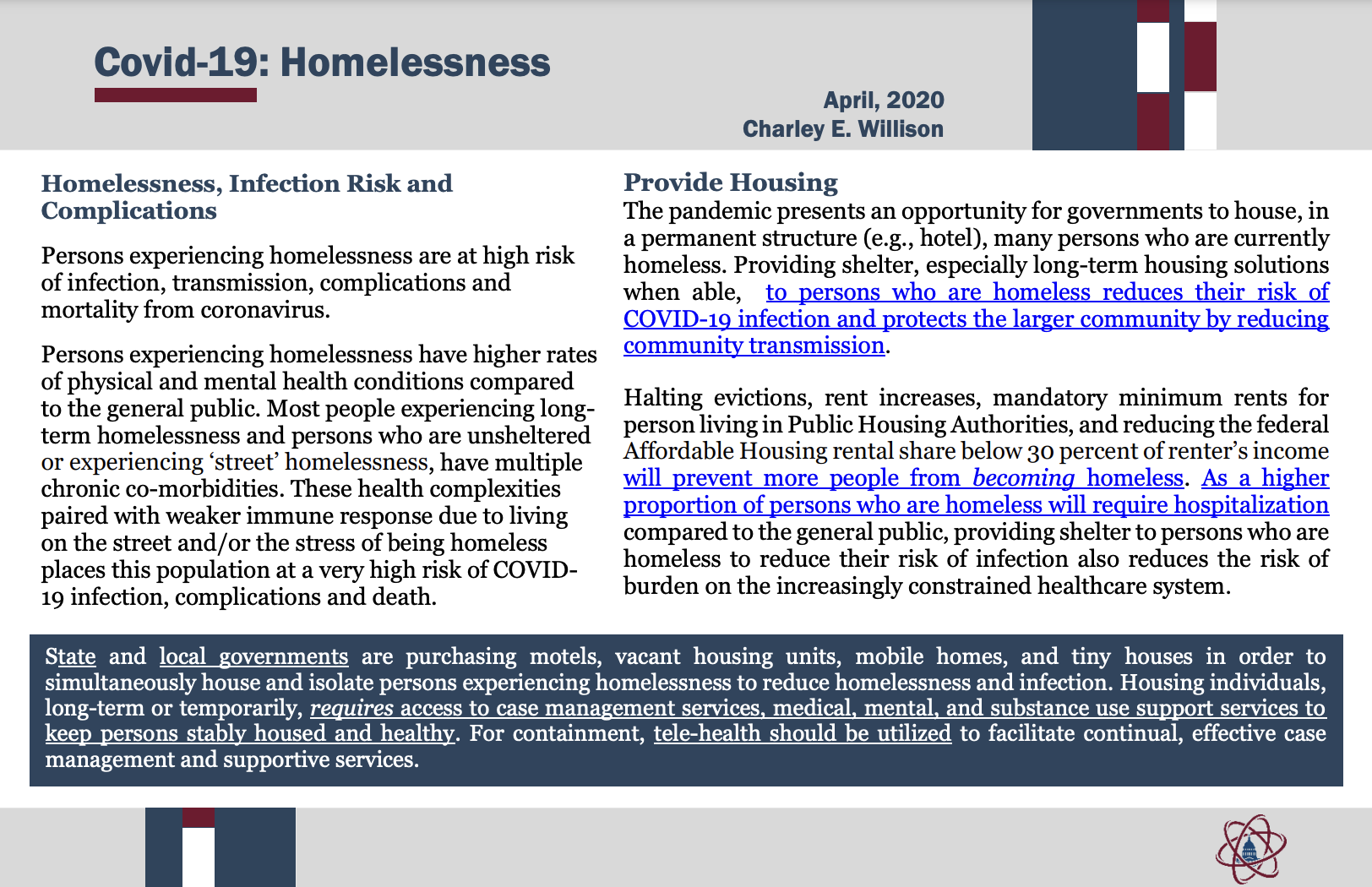
Homelessness, Infection Risk and Complications
Persons experiencing homelessness are at high risk of infection, transmission, complications and mortality from coronavirus. Persons experiencing homelessness have higher rates of physical and mental health conditions compared to the general public. Most people experiencing longterm homelessness and persons who are unsheltered or experiencing ‘street’ homelessness, have multiple chronic co-morbidities. These health complexities paired with weaker immune response due to living on the street and/or the stress of being homeless places this population at a very high risk of COVID19 infection, complications and death.
Provide Housing
The pandemic presents an opportunity for governments to house, in a permanent structure (e.g., hotel), many persons who are currently homeless. Providing shelter, especially long-term or permanent housing solutions when able, to persons who are homeless reduces their risk of COVID-19 infection and protects the larger community by reducing community transmission.
Halting evictions, rent increases, mandatory minimum rents for person living in Public Housing Authorities, and reducing the federal Affordable Housing rental share below 30 percent of renter’s income will prevent more people from becoming homeless. As a higher proportion of persons who are homeless will require hospitalization compared to the general public, providing shelter to persons who are homeless to reduce their risk of infection also reduces the risk of burden on the increasingly constrained healthcare system.
Recommendations
State and local governments are purchasing motels, vacant housing units, mobile homes, and tiny houses in order to simultaneously house and isolate persons experiencing homelessness to reduce homelessness and infection. Housing individuals, long-term or temporarily, requires access to case management services, medical, mental, and substance use support services to keep persons stably housed and healthy. For containment, tele-health should be utilized to facilitate continual, effective case management and supportive services.
The Research-to-Policy Collaboration (RPC) works to bring together research professionals and public officials to support evidence-based policy. Please visit their website to learn more.
Key Information
RPC Website
Research-to-Policy Collaboration
More RPC Resources
RPC Resources
Publication DateApril 1, 2020
Topic Area(s)Community-Specific, Health
Resource TypeWritten Briefs
Share This Page
Homelessness, Infection Risk and Complications
Persons experiencing homelessness are at high risk of infection, transmission, complications and mortality from coronavirus. Persons experiencing homelessness have higher rates of physical and mental health conditions compared to the general public. Most people experiencing longterm homelessness and persons who are unsheltered or experiencing ‘street’ homelessness, have multiple chronic co-morbidities. These health complexities paired with weaker immune response due to living on the street and/or the stress of being homeless places this population at a very high risk of COVID19 infection, complications and death.
Provide Housing
The pandemic presents an opportunity for governments to house, in a permanent structure (e.g., hotel), many persons who are currently homeless. Providing shelter, especially long-term or permanent housing solutions when able, to persons who are homeless reduces their risk of COVID-19 infection and protects the larger community by reducing community transmission.
Halting evictions, rent increases, mandatory minimum rents for person living in Public Housing Authorities, and reducing the federal Affordable Housing rental share below 30 percent of renter’s income will prevent more people from becoming homeless. As a higher proportion of persons who are homeless will require hospitalization compared to the general public, providing shelter to persons who are homeless to reduce their risk of infection also reduces the risk of burden on the increasingly constrained healthcare system.
Recommendations
State and local governments are purchasing motels, vacant housing units, mobile homes, and tiny houses in order to simultaneously house and isolate persons experiencing homelessness to reduce homelessness and infection. Housing individuals, long-term or temporarily, requires access to case management services, medical, mental, and substance use support services to keep persons stably housed and healthy. For containment, tele-health should be utilized to facilitate continual, effective case management and supportive services.
The Research-to-Policy Collaboration (RPC) works to bring together research professionals and public officials to support evidence-based policy. Please visit their website to learn more.

Key Information
RPC Website
Research-to-Policy Collaboration
More RPC Resources
RPC Resources
Publication DateApril 1, 2020
Topic Area(s)Community-Specific, Health
Resource TypeWritten Briefs
Share This Page
LET’S STAY IN TOUCH
Join the Evidence-to-Impact Mailing List
Keep up to date with the latest resources, events, and news from the EIC.




